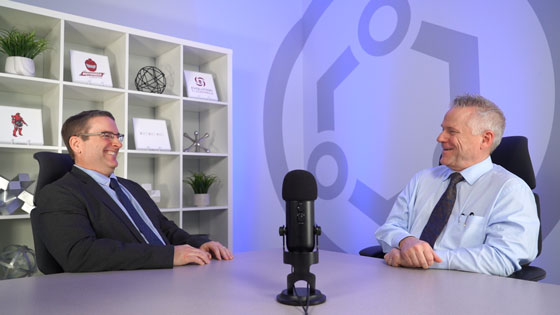Machine operators are incorporating new radio remote control technologies into their operations, but a certain level of expertise is required to wade through specifications. Can they find a partner who understands the technical benefits while simultaneously acknowledging the drawbacks? In this episode, the focus is on radio communication for off-highway equipment from LOR Mobile Controls.
On the hot seat is Fritz Jaessing, an account manager at Morrell Group’s newest subsidiary, LOR Mobile Controls.
Based in central Michigan, LOR Mobile Controls engineers and manufactures control equipment for OEM off-highway clients. Equipment includes radio remote controls, machine start panels, wiring harnesses, and the like.
The introduction of new technology for mobile/off-highway equipment calls for complexity. And with something as critical as communication, one mistake can cause significant complications.
This isn’t hard to picture when looking at the components of a radio control kit:
• Transmitter – Remote control for the operator.
• Modem – Within transmitter, responsible for sending signals.
• Receiver – Receives said signals.
• Wiring Harness – Connects to all the “functions”.
• Antenna Cable(s) – Boost signal strength.
Now, antenna cables aren’t always necessary but are often used in off-highway equipment. Large chunks of metal getting in the way of line-of-sight communication typically isn’t the best for wireless signals.
Fritz and LOR know all of this, and they’ve developed the company’s mission through two simple questions for their customers.
1. How much of your product do you want to control?
2. How many designs do you want available for a machine?
As a result, LOR can fit a product to a customer’s specific application and what works best for the operator. They design their products from scratch, custom-fit to the customer’s specifications, not only for what the customer does but also the whereabouts.
Many may be unfamiliar with the differentiating frequency regulations worldwide as America is one of the more lenient countries. But other governments are stricter when it comes to frequencies.
LOR not only designs custom control equipment but also offers its FEX modem, a 2.4 GHz modem (Worldwide Industry Standard). What makes this modem unique is its ability to achieve the same range and reliability as a 900 MHz modem. Fritz discusses how LOR was able to make this a possibility.
Tim asks Fritz if he’s concerned about the “next generation.” Is this the apex of Radio Communication? Or is there more over the Horizon?
Fritz mentions the unpredictability of any future changes in government regulations. Aside from that, LOR Mobile’s goal is signal reliability. To them, the primary need of a radio remote control is its signal’s reliability, and they are constantly asking themselves what the next steps are to creating the most reliable signal available.
Not only LOR Mobile Controls’ mission but its passion for continuing to achieve makes them the right choice for any off-highway radio communication solution.
Learn more on their website: http://www.lormfg.com/



